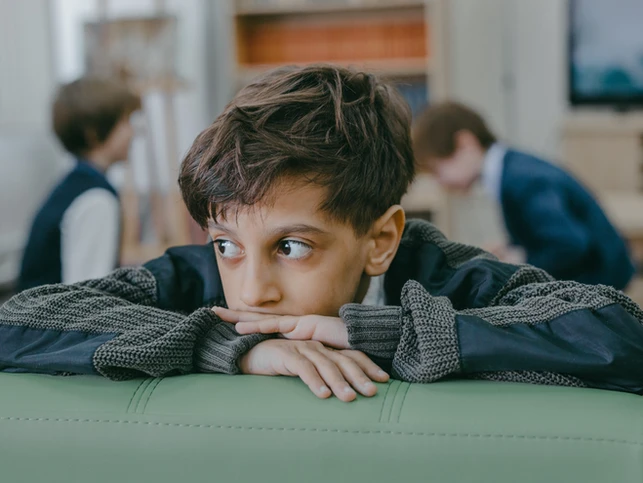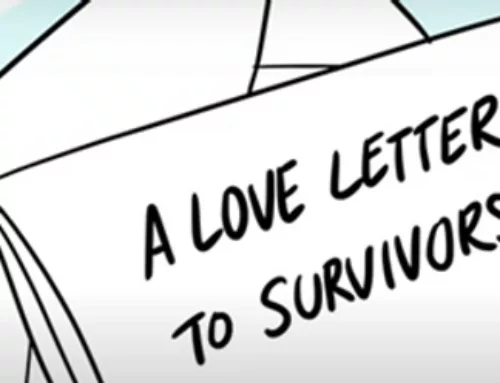Now that #BackToSchool season is here, we wanted to start a conversation on bullying.
We’ve set the groundwork for maintaining #HealthyFriendships over the month of August, discussing what types of people would be compatible with us and would make ideal connections. We discussed how to pick friends that make us better, are good friends to us, are willing to navigate conflicts, and lastly eliminating the unnecessary relationships that are not good for us.
However, there are always people we’ll come across that we won’t get along with. Normally, we can just avoid them, not engage with them or just tolerate them when we have to. Unfortunately, though, sometimes there are people we’ll encounter that may force confrontations, may choose to bully, harass, humiliate or go out of their way to be mean and hurtful to us.
Why do People Bully Others?
Why is this? There are many reasons why people choose to engage in bullying behaviour. Those who bully others are looking to gain a feeling of power, purpose and control over others. One of the most common ways they do this is to focus on something that makes us different or that we may feel insecure about or things we’re afraid of. When this happens, it’s common to blame ourselves, to internalize the shame or embarrassment, and to feel powerless, sad, frustrated, angry, and a host of other emotions.
Those who bully are far more likely than average to have experienced a stressful or traumatic situation such as their parents splitting up, the death of a relative or the birth of a new sibling. When someone doesn’t have healthy outlets for their stress responses (such as exercise, talking with friends, meditating, etc.), they may engage in negative behaviours such as bullying, violence and alcohol abuse, which temporarily mask the issues but usually make them worse in the long-term. Bullying may also be a coping mechanism or a reaction to having been bullied themselves. Or they may have low self esteem – they feel bad about themselves and think making other people feel bad might make them feel better.*
None of the reasons for why people engage in bullying behaviours justifies it. It hurts others as well as the people doing the bullying. It’s abuse and abuse is never okay. But it may help to understand why people bully, to build our empathy and understanding, and to combat bullying in ways that are appropriate, safe, and feel like you can gain a sense of control back.

What is Bullying & How Common is it?
Bullying is a very common issue, especially for young people in schools. 47% of Canadian parents report that their child has been a victim of bullying**. Bullying can come in a variety of forms and through a variety of mediums (in person, online, verbal, physical, psychological, etc). Whenever someone engages in unwanted behaviour designed to hurt, harm or cause distress to another, that’s bullying.
What does Bullying Look Like?
It’s natural for human beings to crave acceptance & understanding. When someone deliberately excludes us & points out our differences in a mean way, it can feel isolating, humiliating, and cruel.
Picking on someone for the clothes they wear, how they talk, their skin colour, their mannerisms, etc. can be really harmful, too. We just want to hide; we become ashamed of who we are or what we have and it can set the tone for how we view ourselves for the whole of our lives.
Vandalizing someone’s stuff or spreading rumours about them. Embarrassing someone on social media. Trolling them. Going out of your way to hurt others physically or mentally are all examples of bullying behaviour and can be extremely damaging to those being targeted.
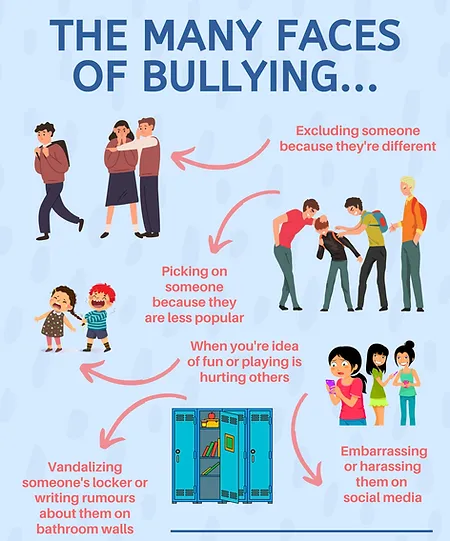
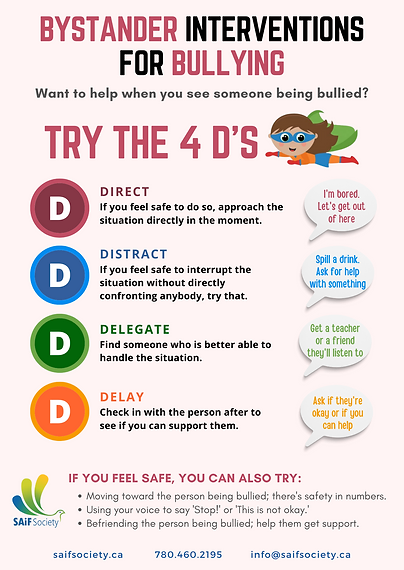
What can you do if you see Bullying Occurring?
Unfortunately, we’ve all observed some type of bullying at one point or another. Just seeing it, even if we’re not the target, can make us feel powerless, paralyzed, afraid. However, what’s really important to note through this process is how to react to help change the outcome if we can and if we feel safe to do so. The simple actions of sticking up for someone can change someone’s life and make things a little bit more bearable.
If you’re a bystander to bullying (basically a witness to it), there are things you can do which we cover under ‘the 4 D’s.’ These are ways to help someone in a situation where they’re being bullied – to intervene, call for help, or support them afterwards.
1. Be Direct! If you feel safe in a situation where you’re witnessing someone being bullied, and you know you can influence the person engaging in the bullying behaviour, you can try:
- Confronting the person directly. It can be encouraging for the victim to have someone stick up for them, it lets them know someone is there for them.
- Saying something like: “I’m bored, let’s go!”can make the person see that you’re not impressed and they might stop and leave with you.
2. Try to Distract! Similar to the first D, distracting the whole situation is another opt out of a hard situation. Again, if you feel safe to do so, you can try:
- Suggesting something else to do, or distract the person doing the bullying to help get the person being bullied out of the situation.
- Sending a funny text or an urgent request to someone engaged in bullying in that moment.
- Doing something silly to draw the attention of the bully away from their target.
3. When things are not safe for you, you could Delegate. If you feel you can’t try either of the 2 Ds above, you can still help by:
- Finding a teacher or a friend to handle the situation
- Gathering your friends to tell the bully to stop. There is power in numbers and if you’re all telling the bully to stop, the bully may choose to run away instead of confronting all of you.
4. It may be that the Ds above all feel unsafe. That is understandable. You can still try to Delay. Delaying to talk to the victim being bullied after the situation shows the person that you care, and is sometimes the safest option for a bystander in a bullying situation.
- Helping them get up, helping them with their things, asking if they’re ‘okay’ can all be supportive and kind.
- Knowing that those who have just been bullied may be angry and upset and may lash out at you when you try to help is normal. You can just back off and try a little later when they are calmer.
- Asking them if you want to help them tell someone what happened is also supportive. You’re a witness to what happened to them and they might need that when they’re ready to ask for help from someone in authority.

Support for bullies? Do you need Help Stopping?
While bullying always involves someone getting hurt, either physically or emotionally, there’s a lot of truth to the statement, “hurt people, hurt people!” Understanding and empathizing with the other side of the person bullying can help the victim and the witnesses involved identify where these actions come from. It is still unfair and wrong – it’s never okay for someone to be abusive. But understanding that everyone needs support and that they might need help to change their behaviour can be helpful to think about. Bullying is about the bully trying to cope with things that are hurting them.
If you’re finding yourself engaging in bullying behaviour – and want to stop hurting yourself and others; if you’re looking for ways to process big emotions that you keep feeling and can’t seem to manage by yourself; if you’re wanting to feel better about yourself, we can help. Just because you’ve been a bully doesn’t mean you always have to be. Visit our page for counselling options because talking to someone who isn’t going to judge you can really help! Or check out the resources at the bottom of the page.

If You’re Being Bullied, Where Can You Go When You Need Help?
Asking for help when you need it means you are doing something right! Beyond talking about it with a trusted and safe adult, reach out to friends, or family that you know care about you and build a circle of support for yourself.
If you need counselling, we have programs for children and teens impacted by bullying. Your parents will need to call us to get that organized but we’re here to help. If you want to make a call (or text) someone on your own, try Kids Help Phone or Bullying Canada to talk about what you’re feeling and the situations you’re dealing with.
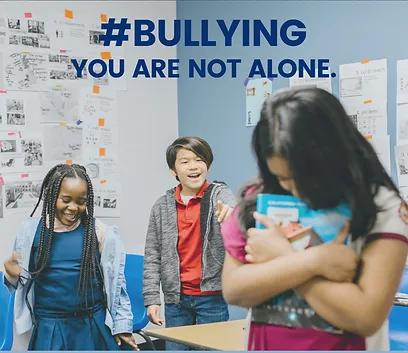
Remember there are always people that care and want to offer help. You don’t have to deal with these things alone – there are people who can help!
Support in St Albert/Sturgeon County:
SAiF Society: Child Play Therapy (ages 5-11): 780.460.2195 x 301 or info@saifsociety.ca
SAiF Society: Youth Counselling (ages 12-17): 780.460.2195 x 301 or info@saifsociety.ca
Online Resources:
KidsHelpPhone: 1.800.668.6868 or text: 686868
Bullying Canada: 1.877.352.4497
___________________________________________________
